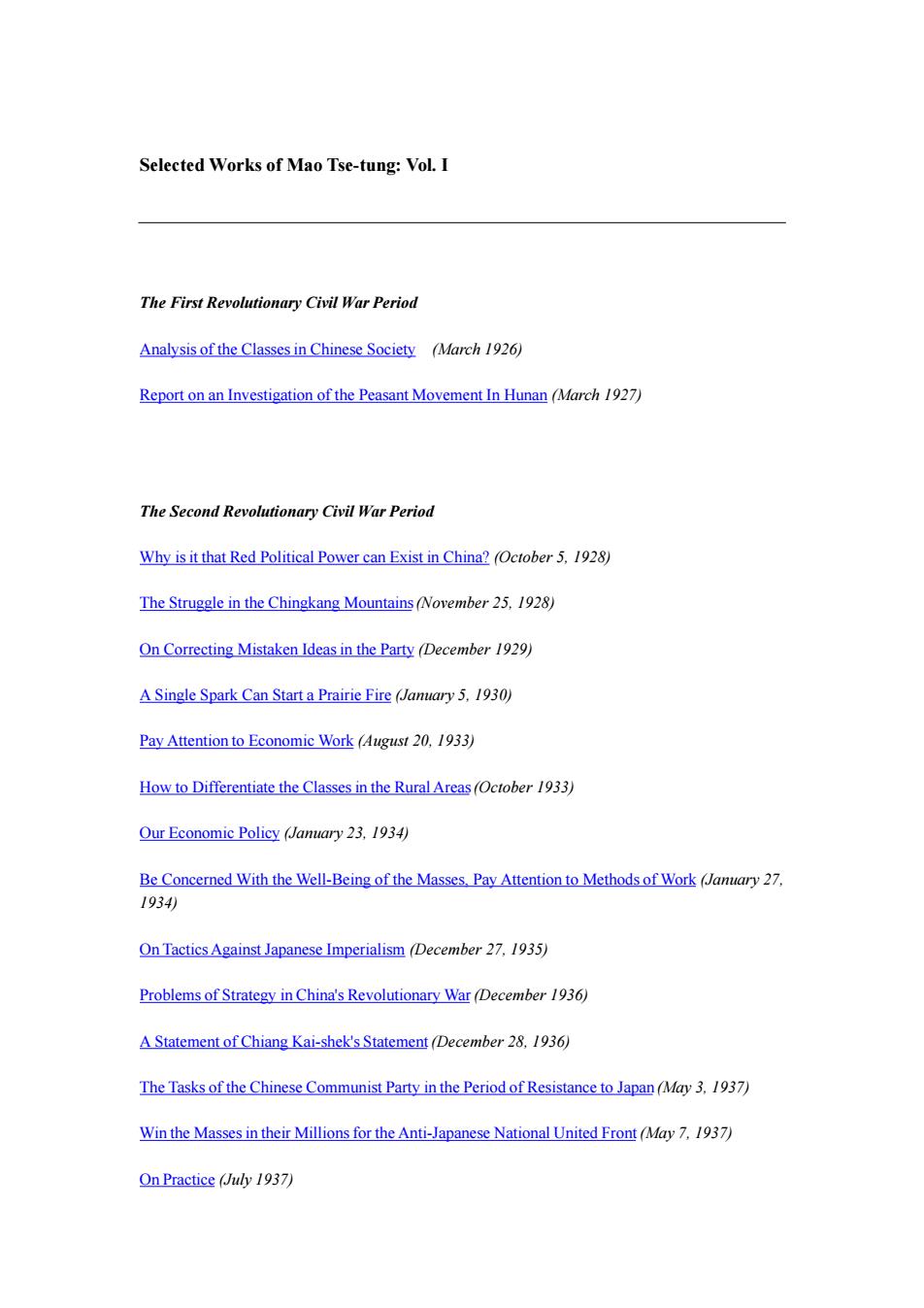
Selected Works of Mao Tse-tung:Vol.I The First Revolutionary Civil War Period Analysis of the Classes in Chinese Society (March 1926) Report on an Investigation of the Peasant Movement In Hunan (March /927) The Second Revolutionary Civil War Period Why is it that Red Political Power can Exist in China?(October 5,1928) The Struggle in the Chingkang Mountains (November 25,1928) On Correcting Mistaken Ideas in the Party (December 1929) A Single Spark Can Start a Prairie Fire (January 5,1930) Pay Attention to Economic Work (August 20,1933) How to Differentiate the Classes in the Rural Areas (October 1933) Our Economic Policy (January 23,1934) Be Concerned With the Well-Being of the Masses,Pay Attention to Methods of Work (January 27, 1934) On Tactics Against Japanese Imperialism (December 27,1935) Problems of Strategy in China's Revolutionary War(December 1936) A Statement of Chiang Kai-shek's Statement (December 28,1936) The Tasks of the Chinese Communist Party in the Period of Resistance to Japan(May 3.1937) Win the Masses in their Millions for the Anti-Japanese National United Front (May 7,1937) On Practice (July 1937)
Selected Works of Mao Tse-tung: Vol. I The First Revolutionary Civil War Period Analysis of the Classes in Chinese Society (March 1926) Report on an Investigation of the Peasant Movement In Hunan (March 1927) The Second Revolutionary Civil War Period Why is it that Red Political Power can Exist in China? (October 5, 1928) The Struggle in the Chingkang Mountains(November 25, 1928) On Correcting Mistaken Ideas in the Party (December 1929) A Single Spark Can Start a Prairie Fire (January 5, 1930) Pay Attention to Economic Work (August 20, 1933) How to Differentiate the Classes in the Rural Areas(October 1933) Our Economic Policy (January 23, 1934) Be Concerned With the Well-Being of the Masses, Pay Attention to Methods of Work (January 27, 1934) On Tactics Against Japanese Imperialism (December 27, 1935) Problems of Strategy in China's Revolutionary War (December 1936) A Statement of Chiang Kai-shek's Statement (December 28, 1936) The Tasks of the Chinese Communist Party in the Period of Resistance to Japan (May 3, 1937) Win the Masses in their Millions for the Anti-Japanese National United Front (May 7, 1937) On Practice (July 1937)
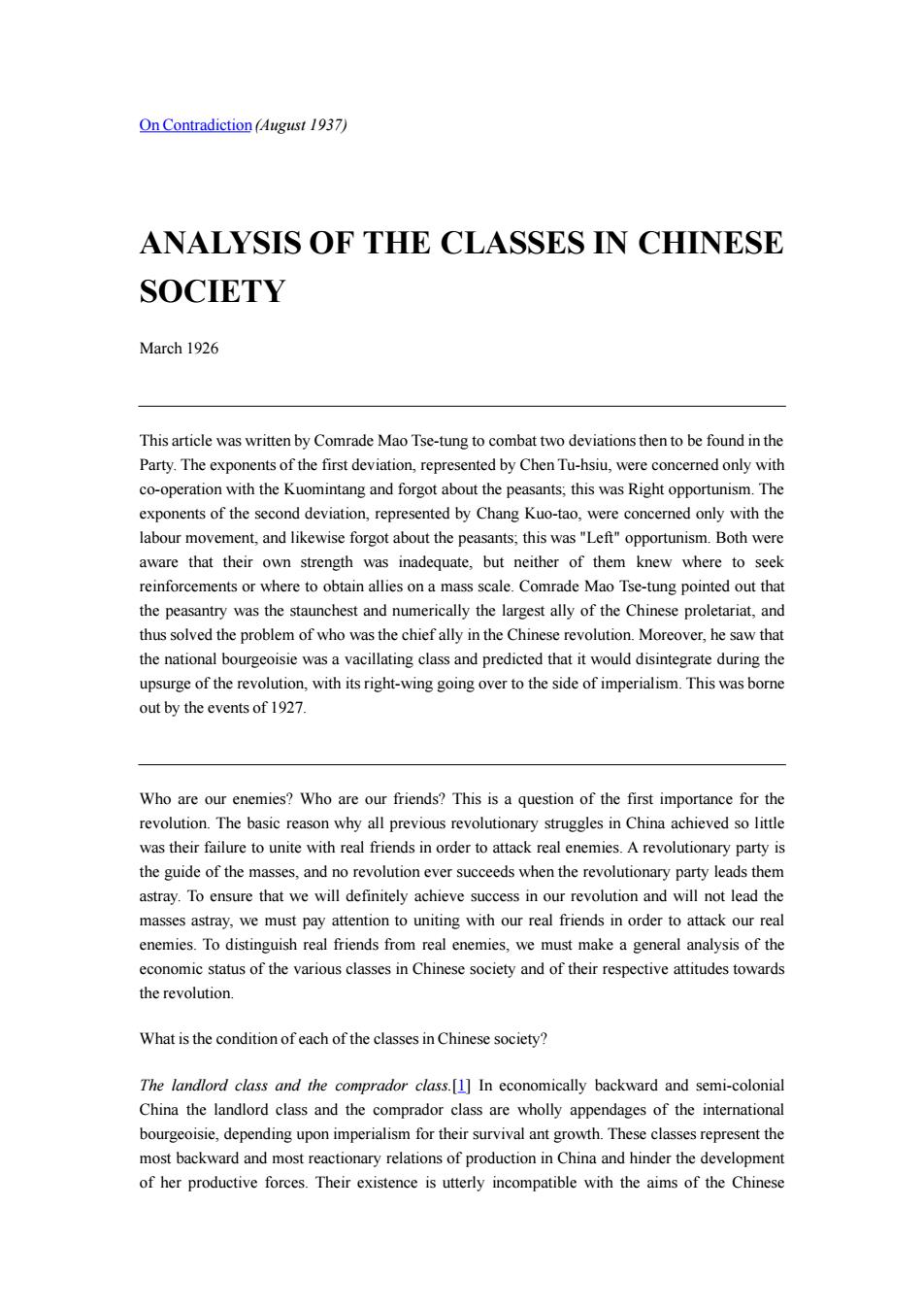
On Contradiction (August 1937) ANALYSIS OF THE CLASSES IN CHINESE SOCIETY March 1926 This article was written by Comrade Mao Tse-tung to combat two deviations then to be found in the Party.The exponents of the first deviation,represented by Chen Tu-hsiu,were concerned only with co-operation with the Kuomintang and forgot about the peasants;this was Right opportunism.The exponents of the second deviation,represented by Chang Kuo-tao,were concerned only with the labour movement,and likewise forgot about the peasants;this was"Left"opportunism.Both were aware that their own strength was inadequate,but neither of them knew where to seek reinforcements or where to obtain allies on a mass scale.Comrade Mao Tse-tung pointed out that the peasantry was the staunchest and numerically the largest ally of the Chinese proletariat,and thus solved the problem of who was the chief ally in the Chinese revolution.Moreover,he saw that the national bourgeoisie was a vacillating class and predicted that it would disintegrate during the upsurge of the revolution,with its right-wing going over to the side of imperialism.This was borne out by the events of 1927. Who are our enemies?Who are our friends?This is a question of the first importance for the revolution.The basic reason why all previous revolutionary struggles in China achieved so little was their failure to unite with real friends in order to attack real enemies.A revolutionary party is the guide of the masses,and no revolution ever succeeds when the revolutionary party leads them astray.To ensure that we will definitely achieve success in our revolution and will not lead the masses astray,we must pay attention to uniting with our real friends in order to attack our real enemies.To distinguish real friends from real enemies,we must make a general analysis of the economic status of the various classes in Chinese society and of their respective attitudes towards the revolution. What is the condition of each of the classes in Chinese society? The landlord class and the comprador class.[1]In economically backward and semi-colonial China the landlord class and the comprador class are wholly appendages of the international bourgeoisie,depending upon imperialism for their survival ant growth.These classes represent the most backward and most reactionary relations of production in China and hinder the development of her productive forces.Their existence is utterly incompatible with the aims of the Chinese
On Contradiction (August 1937) ANALYSIS OF THE CLASSES IN CHINESE SOCIETY March 1926 This article was written by Comrade Mao Tse-tung to combat two deviations then to be found in the Party. The exponents of the first deviation, represented by Chen Tu-hsiu, were concerned only with co-operation with the Kuomintang and forgot about the peasants; this was Right opportunism. The exponents of the second deviation, represented by Chang Kuo-tao, were concerned only with the labour movement, and likewise forgot about the peasants; this was "Left" opportunism. Both were aware that their own strength was inadequate, but neither of them knew where to seek reinforcements or where to obtain allies on a mass scale. Comrade Mao Tse-tung pointed out that the peasantry was the staunchest and numerically the largest ally of the Chinese proletariat, and thus solved the problem of who was the chief ally in the Chinese revolution. Moreover, he saw that the national bourgeoisie was a vacillating class and predicted that it would disintegrate during the upsurge of the revolution, with its right-wing going over to the side of imperialism. This was borne out by the events of 1927. Who are our enemies? Who are our friends? This is a question of the first importance for the revolution. The basic reason why all previous revolutionary struggles in China achieved so little was their failure to unite with real friends in order to attack real enemies. A revolutionary party is the guide of the masses, and no revolution ever succeeds when the revolutionary party leads them astray. To ensure that we will definitely achieve success in our revolution and will not lead the masses astray, we must pay attention to uniting with our real friends in order to attack our real enemies. To distinguish real friends from real enemies, we must make a general analysis of the economic status of the various classes in Chinese society and of their respective attitudes towards the revolution. What is the condition of each of the classes in Chinese society? The landlord class and the comprador class.[1] In economically backward and semi-colonial China the landlord class and the comprador class are wholly appendages of the international bourgeoisie, depending upon imperialism for their survival ant growth. These classes represent the most backward and most reactionary relations of production in China and hinder the development of her productive forces. Their existence is utterly incompatible with the aims of the Chinese
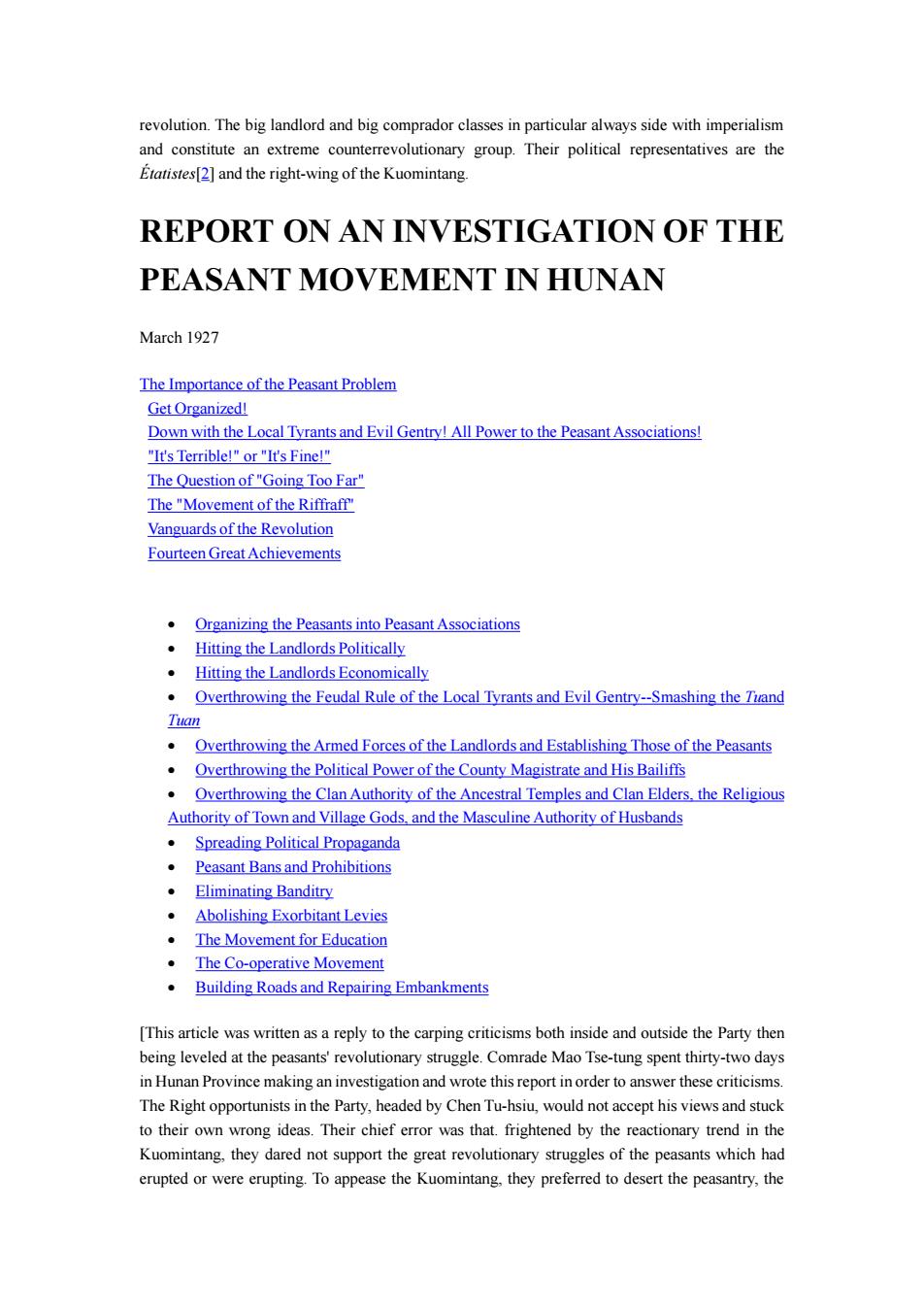
revolution.The big landlord and big comprador classes in particular always side with imperialism and constitute an extreme counterrevolutionary group.Their political representatives are the Etatistes[2]and the right-wing of the Kuomintang. REPORT ON ANINVESTIGATION OF THE PEASANT MOVEMENT IN HUNAN March 1927 The Importance of the Peasant Problem Get Organized! Down with the Local Tyrants and Evil Gentry!All Power to the Peasant Associations! "It's Terrible!"or "It's Fine!" The Question of "Going Too Far" The "Movement of the Riffraff" Vanguards of the Revolution Fourteen Great Achievements Organizing the Peasants into Peasant Associations Hitting the Landlords Politically Hitting the Landlords Economically Overthrowing the Feudal Rule of the Local Tyrants and Evil Gentry-Smashing the Tuand Tuan Overthrowing the Armed Forces of the Landlords and Establishing Those of the Peasants Overthrowing the Political Power of the County Magistrate and His Bailiffs Overthrowing the Clan Authority of the Ancestral Temples and Clan Elders,the Religious Authority of Town and Village Gods,and the Masculine Authority of Husbands Spreading Political Propaganda ● Peasant Bans and Prohibitions Eliminating Banditry Abolishing Exorbitant Levies The Movement for Education The Co-operative Movement Building Roads and Repairing Embankments [This article was written as a reply to the carping criticisms both inside and outside the Party then being leveled at the peasants'revolutionary struggle.Comrade Mao Tse-tung spent thirty-two days in Hunan Province making an investigation and wrote this report in order to answer these criticisms. The Right opportunists in the Party,headed by Chen Tu-hsiu,would not accept his views and stuck to their own wrong ideas.Their chief error was that.frightened by the reactionary trend in the Kuomintang,they dared not support the great revolutionary struggles of the peasants which had erupted or were erupting.To appease the Kuomintang,they preferred to desert the peasantry,the
revolution. The big landlord and big comprador classes in particular always side with imperialism and constitute an extreme counterrevolutionary group. Their political representatives are the Étatistes[2] and the right-wing of the Kuomintang. REPORT ON AN INVESTIGATION OF THE PEASANT MOVEMENT IN HUNAN March 1927 The Importance of the Peasant Problem Get Organized! Down with the Local Tyrants and Evil Gentry! All Power to the Peasant Associations! "It's Terrible!" or "It's Fine!" The Question of "Going Too Far" The "Movement of the Riffraff" Vanguards of the Revolution Fourteen Great Achievements • Organizing the Peasants into Peasant Associations • Hitting the Landlords Politically • Hitting the Landlords Economically • Overthrowing the Feudal Rule of the Local Tyrants and Evil Gentry-Smashing the Tuand Tuan • Overthrowing the Armed Forces of the Landlords and Establishing Those of the Peasants • Overthrowing the Political Power of the County Magistrate and His Bailiffs • Overthrowing the Clan Authority of the Ancestral Temples and Clan Elders, the Religious Authority of Town and Village Gods, and the Masculine Authority of Husbands • Spreading Political Propaganda • Peasant Bans and Prohibitions • Eliminating Banditry • Abolishing Exorbitant Levies • The Movement for Education • The Co-operative Movement • Building Roads and Repairing Embankments [This article was written as a reply to the carping criticisms both inside and outside the Party then being leveled at the peasants' revolutionary struggle. Comrade Mao Tse-tung spent thirty-two days in Hunan Province making an investigation and wrote this report in order to answer these criticisms. The Right opportunists in the Party, headed by Chen Tu-hsiu, would not accept his views and stuck to their own wrong ideas. Their chief error was that. frightened by the reactionary trend in the Kuomintang, they dared not support the great revolutionary struggles of the peasants which had erupted or were erupting. To appease the Kuomintang, they preferred to desert the peasantry, the
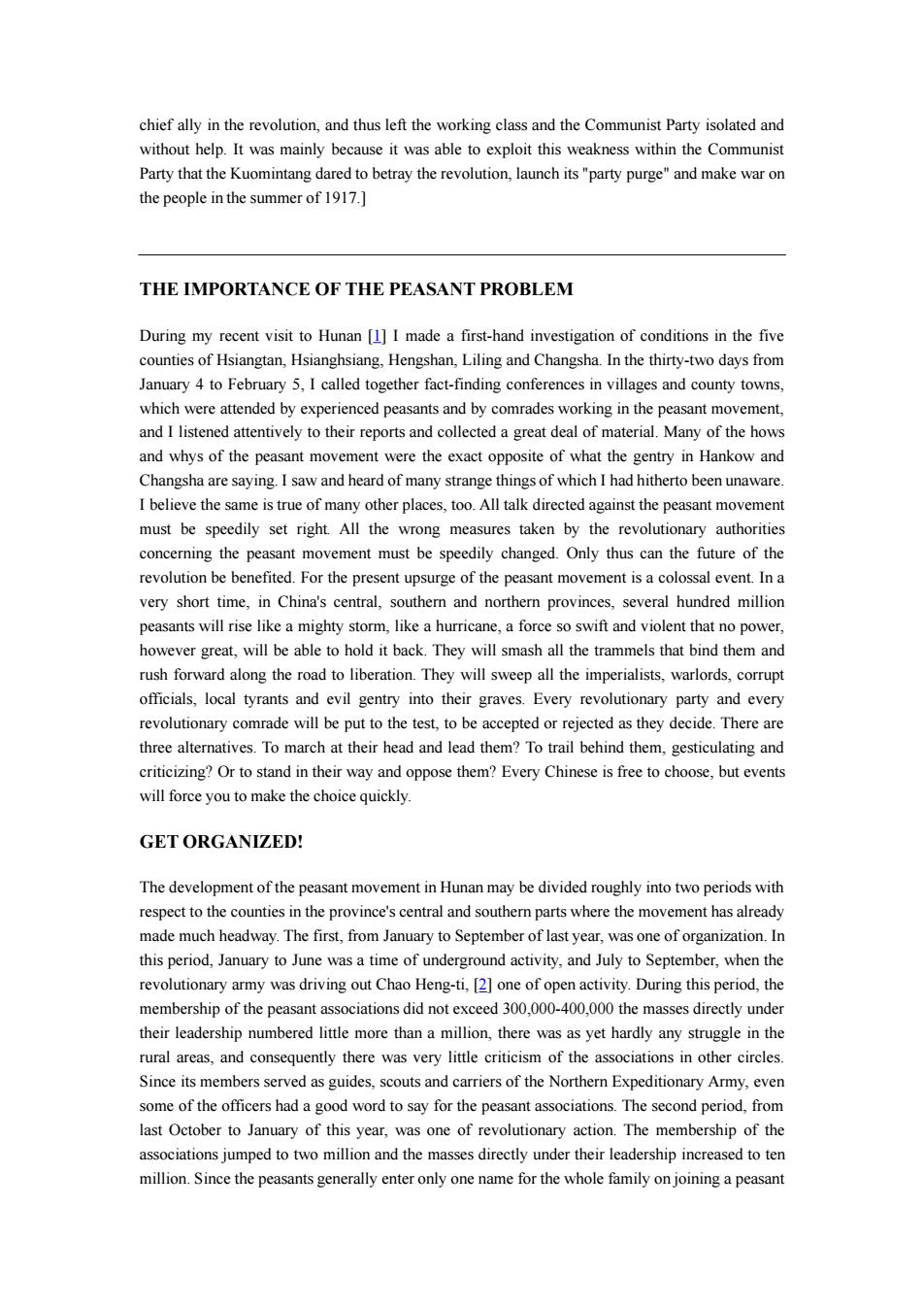
chief ally in the revolution,and thus left the working class and the Communist Party isolated and without help.It was mainly because it was able to exploit this weakness within the Communist Party that the Kuomintang dared to betray the revolution,launch its"party purge"and make war on the people in the summer of 1917.] THE IMPORTANCE OF THE PEASANT PROBLEM During my recent visit to Hunan [1]I made a first-hand investigation of conditions in the five counties of Hsiangtan,Hsianghsiang,Hengshan,Liling and Changsha.In the thirty-two days from January 4 to February 5,I called together fact-finding conferences in villages and county towns, which were attended by experienced peasants and by comrades working in the peasant movement, and I listened attentively to their reports and collected a great deal of material.Many of the hows and whys of the peasant movement were the exact opposite of what the gentry in Hankow and Changsha are saying.I saw and heard of many strange things of which I had hitherto been unaware. I believe the same is true of many other places,too.All talk directed against the peasant movement must be speedily set right.All the wrong measures taken by the revolutionary authorities concerning the peasant movement must be speedily changed.Only thus can the future of the revolution be benefited.For the present upsurge of the peasant movement is a colossal event.In a very short time,in China's central,southern and northern provinces,several hundred million peasants will rise like a mighty storm,like a hurricane,a force so swift and violent that no power, however great,will be able to hold it back.They will smash all the trammels that bind them and rush forward along the road to liberation.They will sweep all the imperialists,warlords,corrupt officials,local tyrants and evil gentry into their graves.Every revolutionary party and every revolutionary comrade will be put to the test,to be accepted or rejected as they decide.There are three alternatives.To march at their head and lead them?To trail behind them,gesticulating and criticizing?Or to stand in their way and oppose them?Every Chinese is free to choose,but events will force you to make the choice quickly. GET ORGANIZED! The development of the peasant movement in Hunan may be divided roughly into two periods with respect to the counties in the province's central and southern parts where the movement has already made much headway.The first,from January to September of last year,was one of organization.In this period,January to June was a time of underground activity,and July to September,when the revolutionary army was driving out Chao Heng-ti,[2]one of open activity.During this period,the membership of the peasant associations did not exceed 300.000-400,000 the masses directly under their leadership numbered little more than a million,there was as yet hardly any struggle in the rural areas,and consequently there was very little criticism of the associations in other circles. Since its members served as guides,scouts and carriers of the Northern Expeditionary Army,even some of the officers had a good word to say for the peasant associations.The second period,from last October to January of this year,was one of revolutionary action.The membership of the associations jumped to two million and the masses directly under their leadership increased to ten million.Since the peasants generally enter only one name for the whole family on joining a peasant
chief ally in the revolution, and thus left the working class and the Communist Party isolated and without help. It was mainly because it was able to exploit this weakness within the Communist Party that the Kuomintang dared to betray the revolution, launch its "party purge" and make war on the people in the summer of 1917.] THE IMPORTANCE OF THE PEASANT PROBLEM During my recent visit to Hunan [1] I made a first-hand investigation of conditions in the five counties of Hsiangtan, Hsianghsiang, Hengshan, Liling and Changsha. In the thirty-two days from January 4 to February 5, I called together fact-finding conferences in villages and county towns, which were attended by experienced peasants and by comrades working in the peasant movement, and I listened attentively to their reports and collected a great deal of material. Many of the hows and whys of the peasant movement were the exact opposite of what the gentry in Hankow and Changsha are saying. I saw and heard of many strange things of which I had hitherto been unaware. I believe the same is true of many other places, too. All talk directed against the peasant movement must be speedily set right. All the wrong measures taken by the revolutionary authorities concerning the peasant movement must be speedily changed. Only thus can the future of the revolution be benefited. For the present upsurge of the peasant movement is a colossal event. In a very short time, in China's central, southern and northern provinces, several hundred million peasants will rise like a mighty storm, like a hurricane, a force so swift and violent that no power, however great, will be able to hold it back. They will smash all the trammels that bind them and rush forward along the road to liberation. They will sweep all the imperialists, warlords, corrupt officials, local tyrants and evil gentry into their graves. Every revolutionary party and every revolutionary comrade will be put to the test, to be accepted or rejected as they decide. There are three alternatives. To march at their head and lead them? To trail behind them, gesticulating and criticizing? Or to stand in their way and oppose them? Every Chinese is free to choose, but events will force you to make the choice quickly. GET ORGANIZED! The development of the peasant movement in Hunan may be divided roughly into two periods with respect to the counties in the province's central and southern parts where the movement has already made much headway. The first, from January to September of last year, was one of organization. In this period, January to June was a time of underground activity, and July to September, when the revolutionary army was driving out Chao Heng-ti, [2] one of open activity. During this period, the membership of the peasant associations did not exceed 300,000-400,000 the masses directly under their leadership numbered little more than a million, there was as yet hardly any struggle in the rural areas, and consequently there was very little criticism of the associations in other circles. Since its members served as guides, scouts and carriers of the Northern Expeditionary Army, even some of the officers had a good word to say for the peasant associations. The second period, from last October to January of this year, was one of revolutionary action. The membership of the associations jumped to two million and the masses directly under their leadership increased to ten million. Since the peasants generally enter only one name for the whole family on joining a peasant
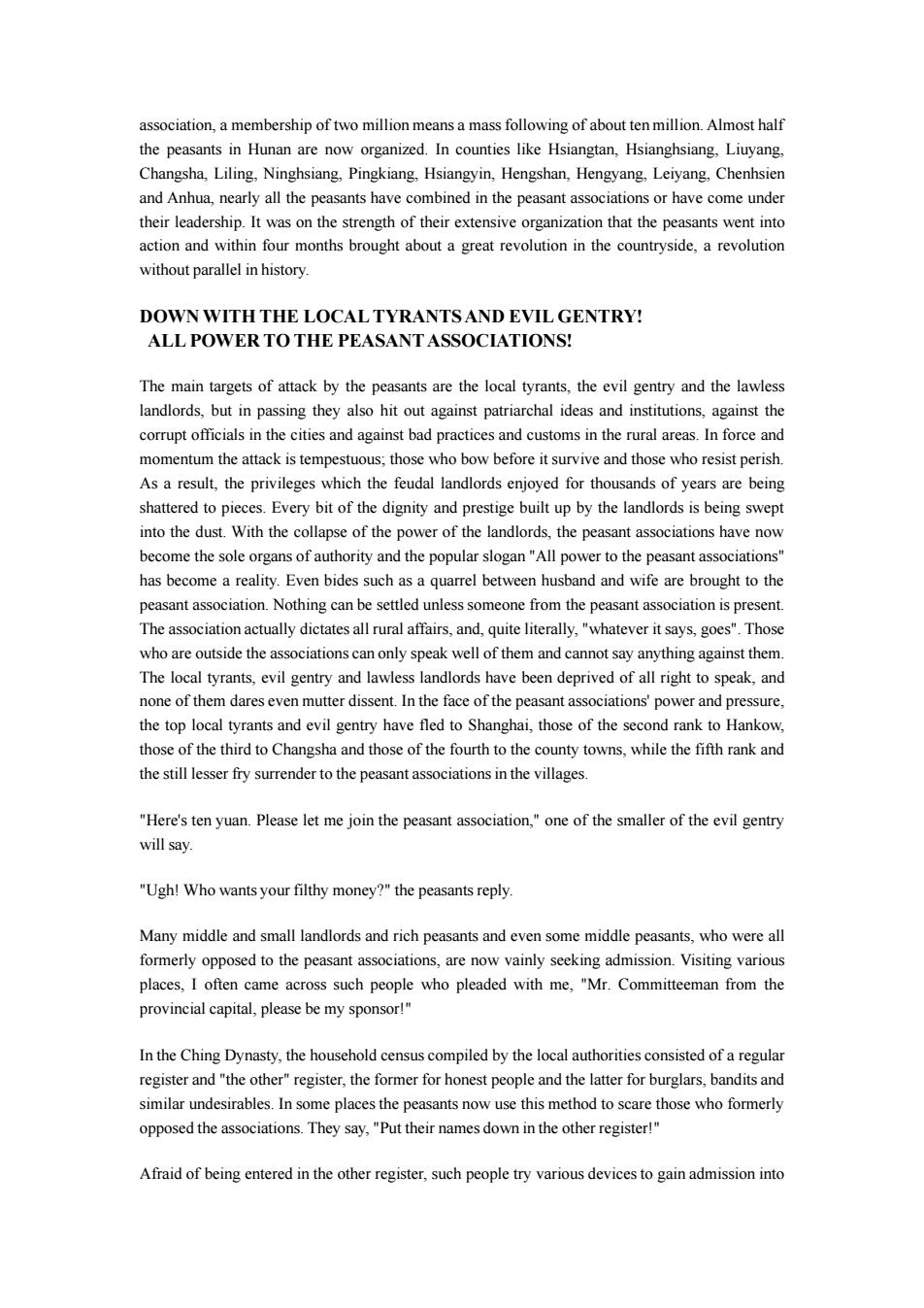
association,a membership of two million means a mass following of about ten million.Almost half the peasants in Hunan are now organized.In counties like Hsiangtan,Hsianghsiang,Liuyang, Changsha,Liling,Ninghsiang,Pingkiang,Hsiangyin,Hengshan,Hengyang,Leiyang,Chenhsien and Anhua,nearly all the peasants have combined in the peasant associations or have come under their leadership.It was on the strength of their extensive organization that the peasants went into action and within four months brought about a great revolution in the countryside,a revolution without parallel in history DOWN WITH THE LOCAL TYRANTSAND EVIL GENTRY! ALL POWER TO THE PEASANTASSOCIATIONS! The main targets of attack by the peasants are the local tyrants,the evil gentry and the lawless landlords,but in passing they also hit out against patriarchal ideas and institutions,against the corrupt officials in the cities and against bad practices and customs in the rural areas.In force and momentum the attack is tempestuous;those who bow before it survive and those who resist perish. As a result,the privileges which the feudal landlords enjoyed for thousands of years are being shattered to pieces.Every bit of the dignity and prestige built up by the landlords is being swept into the dust.With the collapse of the power of the landlords,the peasant associations have now become the sole organs of authority and the popular slogan "All power to the peasant associations" has become a reality.Even bides such as a quarrel between husband and wife are brought to the peasant association.Nothing can be settled unless someone from the peasant association is present. The association actually dictates all rural affairs,and,quite literally,"whatever it says,goes".Those who are outside the associations can only speak well of them and cannot say anything against them. The local tyrants,evil gentry and lawless landlords have been deprived of all right to speak,and none of them dares even mutter dissent.In the face of the peasant associations'power and pressure, the top local tyrants and evil gentry have fled to Shanghai,those of the second rank to Hankow, those of the third to Changsha and those of the fourth to the county towns,while the fifth rank and the still lesser fry surrender to the peasant associations in the villages. "Here's ten yuan.Please let me join the peasant association,"one of the smaller of the evil gentry will say. "Ugh!Who wants your filthy money?"the peasants reply. Many middle and small landlords and rich peasants and even some middle peasants,who were all formerly opposed to the peasant associations,are now vainly seeking admission.Visiting various places,I often came across such people who pleaded with me,"Mr.Committeeman from the provincial capital,please be my sponsor!" In the Ching Dynasty,the household census compiled by the local authorities consisted of a regular register and "the other"register,the former for honest people and the latter for burglars,bandits and similar undesirables.In some places the peasants now use this method to scare those who formerly opposed the associations.They say,"Put their names down in the other register!" Afraid of being entered in the other register,such people try various devices to gain admission into
association, a membership of two million means a mass following of about ten million. Almost half the peasants in Hunan are now organized. In counties like Hsiangtan, Hsianghsiang, Liuyang, Changsha, Liling, Ninghsiang, Pingkiang, Hsiangyin, Hengshan, Hengyang, Leiyang, Chenhsien and Anhua, nearly all the peasants have combined in the peasant associations or have come under their leadership. It was on the strength of their extensive organization that the peasants went into action and within four months brought about a great revolution in the countryside, a revolution without parallel in history. DOWN WITH THE LOCAL TYRANTS AND EVIL GENTRY! ALL POWER TO THE PEASANT ASSOCIATIONS! The main targets of attack by the peasants are the local tyrants, the evil gentry and the lawless landlords, but in passing they also hit out against patriarchal ideas and institutions, against the corrupt officials in the cities and against bad practices and customs in the rural areas. In force and momentum the attack is tempestuous; those who bow before it survive and those who resist perish. As a result, the privileges which the feudal landlords enjoyed for thousands of years are being shattered to pieces. Every bit of the dignity and prestige built up by the landlords is being swept into the dust. With the collapse of the power of the landlords, the peasant associations have now become the sole organs of authority and the popular slogan "All power to the peasant associations" has become a reality. Even bides such as a quarrel between husband and wife are brought to the peasant association. Nothing can be settled unless someone from the peasant association is present. The association actually dictates all rural affairs, and, quite literally, "whatever it says, goes". Those who are outside the associations can only speak well of them and cannot say anything against them. The local tyrants, evil gentry and lawless landlords have been deprived of all right to speak, and none of them dares even mutter dissent. In the face of the peasant associations' power and pressure, the top local tyrants and evil gentry have fled to Shanghai, those of the second rank to Hankow, those of the third to Changsha and those of the fourth to the county towns, while the fifth rank and the still lesser fry surrender to the peasant associations in the villages. "Here's ten yuan. Please let me join the peasant association," one of the smaller of the evil gentry will say. "Ugh! Who wants your filthy money?" the peasants reply. Many middle and small landlords and rich peasants and even some middle peasants, who were all formerly opposed to the peasant associations, are now vainly seeking admission. Visiting various places, I often came across such people who pleaded with me, "Mr. Committeeman from the provincial capital, please be my sponsor!" In the Ching Dynasty, the household census compiled by the local authorities consisted of a regular register and "the other" register, the former for honest people and the latter for burglars, bandits and similar undesirables. In some places the peasants now use this method to scare those who formerly opposed the associations. They say, "Put their names down in the other register!" Afraid of being entered in the other register, such people try various devices to gain admission into